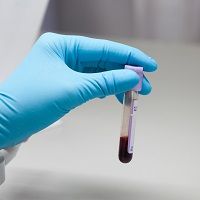Blood Biomarker May Detect Lung Cancer
Study results presented at CHEST 2014 show that patients with stage I to stage III non-small cell lung cancer have different metabolite profiles in their blood than those of patients who are at risk but do not have lung cancer.

A new study shows that patients with stage I to stage III non-small cell lung cancer have different metabolite profiles in their blood than those of patients who are at risk but do not have lung cancer. The study abstract was released in an online supplement of the journal CHEST and will be presented at CHEST 2014, the annual meeting of the American College of Chest Physicians in Austin, Texas, on October 29.
Researchers at Cleveland Clinic studied the blood serum of 284 subjects, 48% of whom were female with a mean age of 68 years. The subjects were diagnosed with adenocarcinoma or squamous lung cancer: 44% of those at stage I, 17% at stage II, and 39% at stage III. A control group of 194 patients—who matched the cancer patients in age, gender, smoking history, COPD, diabetes, and blood lipids were at risk for lung cancer but did not have the disease. There were 534 metabolites identified, with the concentration of 149 metabolites differing significantly between the cancer and control groups.
“Our study results showed that patients with lung cancer have altered metabolic processes,” said Peter J. Mazzone, MD, FCCP, Director of the Lung Cancer Program for the Respiratory Institute at Cleveland Clinic. “This information could lead to the development of a diagnostic biomarker for early detection of lung cancer.”
Source: American College of Chest Physicians